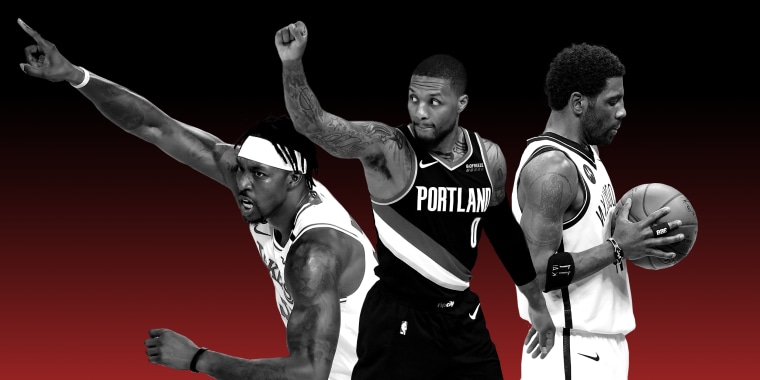As Israel sends air and ground troops into Gaza in violation of international law, more people in the United States, from members of Congress to Jewish American organizations, are speaking out against it. Constituencies whom the Israeli state has traditionally looked to for support are in rebellion. Criticism is also coming from the world of sports.
Constituencies who the Israeli state has traditionally looked to for support are in rebellion.
If there has ever been a third rail at the intersection of sports and politics, it has been expressing any kind of solidarity with the Palestinian people that requires criticizing Israel.
In 2014, as Israeli forces bombarded Gaza in what was called Operation Protective Edge, NBA All-Star Dwight Howard tweeted, "#FreePalestine." The outrage was so intense that he took the tweet down and tweeted: "Previous tweet was a mistake. I have never commented on international politics and never will."
This silence is enforced by a bipartisan consensus that "Israel has the right to defend itself," even when its military goes on offense, occupying neighborhoods and expelling their residents. Palestinians are never, in the eyes of the U.S., granted that same privilege of the "right to defense." Fears of transgressing a political consensus and of being branded as antisemitic have bred quietude in the face of violence and occupation.
But those days of skittish silence may be done. The brutal evictions of Jerusalem's Sheikh Jarrah neighborhood, the attacks on protesters and the bombardment of Gaza are reported to have killed at least 115 Palestinians, 27 of them children, and eight Israelis.
These horrors are provoking a response, but they're not the only reason people are speaking out. Among a small group of athletes, connections have been forged between the Black Lives Matter movement and the Palestinian liberation struggle. And these athletes are embracing a new internationalism defined by anti-racism and standing on the side of the oppressed.
By my count, several prominent U.S. athletes have posted words of solidarity with the Palestinian people. These include Brooklyn Nets guard Kyrie Irving and Portland Trailblazers guard Damian Lillard — both of whom have been outspoken for racial justice in their own country — and Trailblazers center Jusuf Nurkić. WNBA star Layshia Clarendon has shared messages of solidarity with the Palestinian people. Soccer stars Tziarra King and Midge Purce have both shared messages of support on Instagram.
Fears of transgressing a political consensus as well as fears of being branded as anti-Semitic have bred quietude in the face of violence and occupation.
This solidarity of U.S. athletes has been narrow, albeit significant. When U.S. athletes speak out, it has global ramifications. This is not only because of the cultural platform; it's also because athletes' resistance reflects to the country and the world a new reality that the U.S., the main backer of the Israeli state, is far from united in its support.
Athletic resistance to Israeli's politics is more pronounced outside the U.S., where not only individual players but entire teams have been raising their voices. Canadian professional wrestler Sami Zayn has been amplifying the injustice of the Sheikh Jarrah attacks.
In 2008, Egyptian soccer icon Mohamed Aboutrika was admonished for lifting his shirt on the pitch, revealing a T-shirt underneath with the words "Sympathize with Gaza." He was scolded for bringing politics onto the pitch. This week, he posted a prayer calling for God to watch over both the Palestinian people and the Al-Aqsa Mosque, which the Israel Defense Forces entered to assault people during prayers.
Liverpool's superstar forward Mohamed Salah, who is also Egyptian, tweeted: "I'm calling on all the world leaders including on the prime minister of the country that has been my home for the past four years to do everything in their power to make sure the violence and killing of innocent people stops immediately. Enough is enough." His teammate Sadio Mané posted a photo of Al-Aqsa on Tuesday with the message "Free Palestine."
Statements have also come from Leicester City's Turkish defender, Çaglar Söyüncü, his teammate Wesley Fofana, Manchester United's Paul Pogba and Russian mixed martial arts legend Khabib Nurmagomedov. Manchester City's Riyad Mahrez, a midfielder from Algeria, has tweeted a viral post of the Palestinian flag with the hashtag #SaveSheikhJarrah.
Entire teams have issued statements. The Chilean club Palestino, which was formed by Palestinian immigrants a century ago, saw the entire team wear kaffiyehs Saturday.
Whether more athletes, particularly U.S. athletes, speak out will depend upon how deep the crisis becomes — and as of this writing, the depths have tragically yet to be reached. But once silence has been broken, it is very difficult to stifle people back into submission.
Speaking out for Palestinians as a principle of social justice could become an integral part of the new anti-racist consciousness among U.S. athletes. If that happens, Benjamin Netanyahu will have no one to blame but himself. Israel's aggression is breeding resistance, and that resistance is being amplified.

